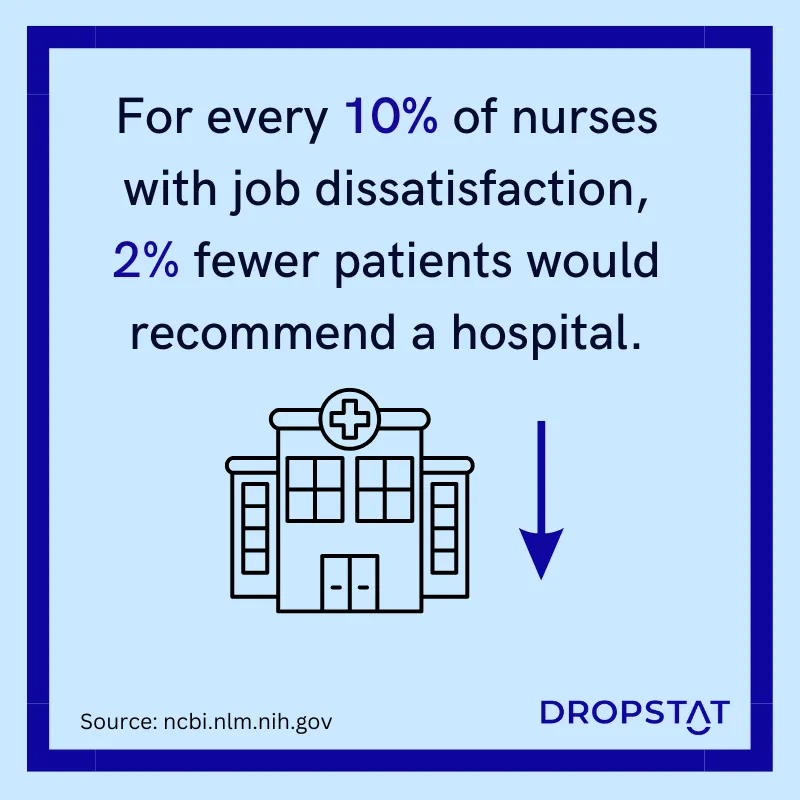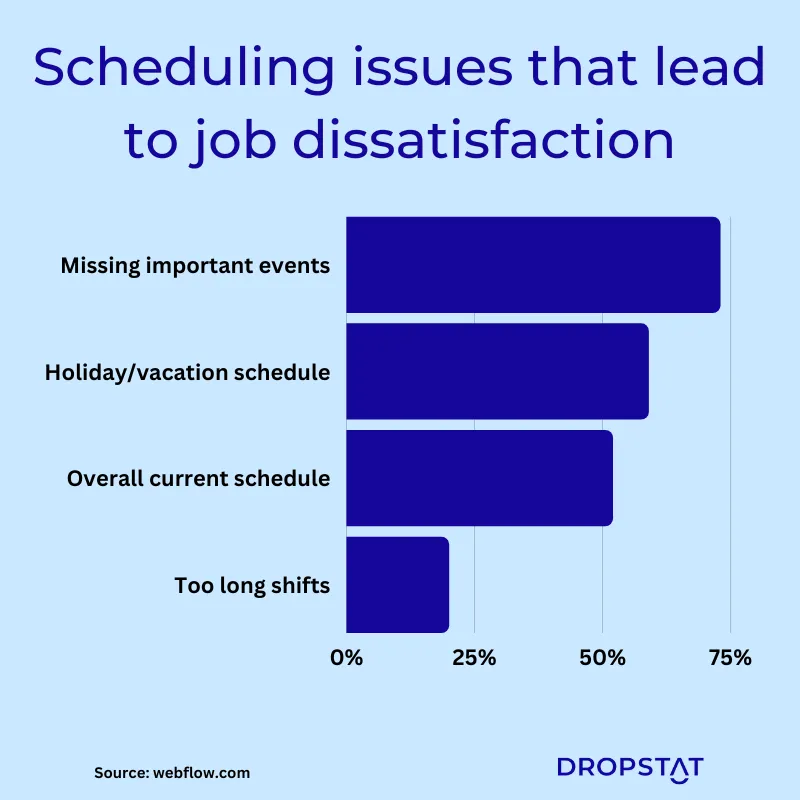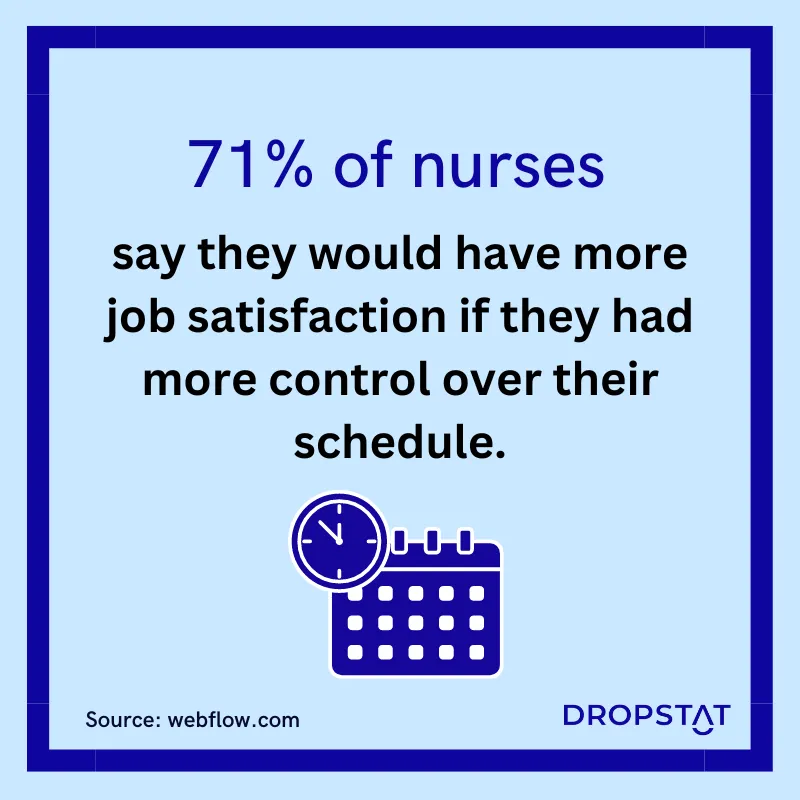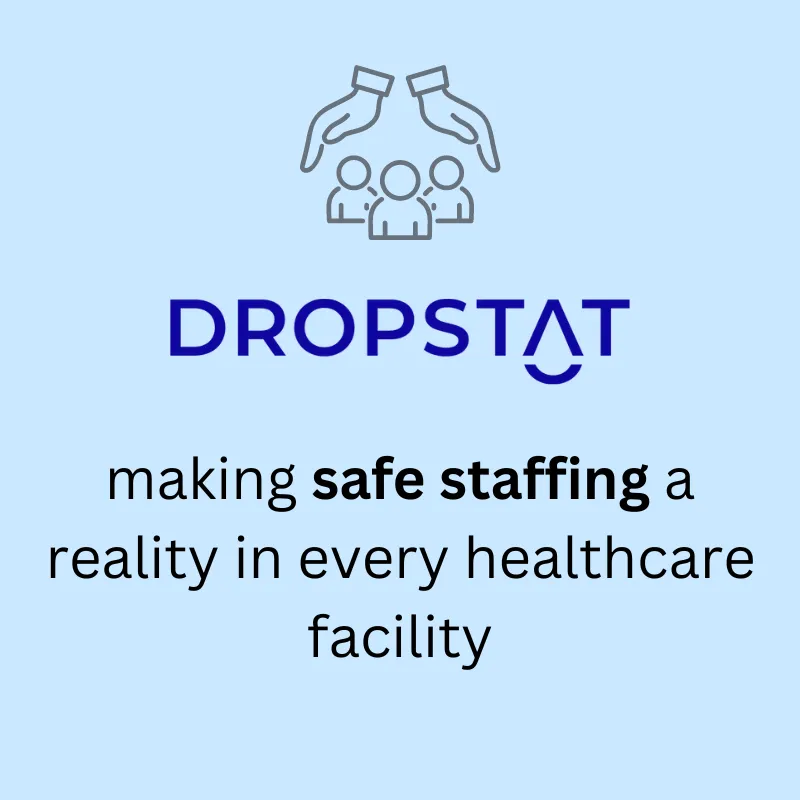What is employee satisfaction?
Employee satisfaction is a measure of an employee’s contentedness with their job. This measures whether or how much they like the job, or specific parts of the job, such as the type of work, management, and work culture.
People who enter the nursing workforce hope to make a difference in other people’s lives. But nursing is often hard, and nurses must invest in their needs to gain satisfaction and personal fulfillment from the job. Nurses can generate internal motivation to continue working successfully and with a sense of purpose when the organizational aspects of their work environment are satisfactory.
Why nurse job satisfaction is important
When employees are satisfied with their jobs, their output is maximized. In many ways, the overall success of a healthcare facility reflects the levels of nursing satisfaction.
- Long-term staff retention
Nurse satisfaction significantly affects nurse retention and naturally increases productivity and engagement, making your nurses more valuable to the team. Satisfied nurses are motivated to grow into positions of greater responsibility.
Without job satisfaction, nurses will leave the healthcare facility that invested in their training and migrate to facilities with better terms of employment. When a nurse leaves, it costs the facility on average $40,038 to replace, and managers waste valuable resources to recruit and train new staff. Respond to job dissatisfaction and retain experienced nurses since they are your greatest asset.
Job satisfaction is directly linked to nursing turnover. High nurse turnover has secondary negative impacts, such as reduced patient satisfaction and patient outcomes, especially in hospitals that provide acute care.

- Enhanced Patient Care
Nursing research shows that the quality of patient care suffers due to burnout. Nurses experience burnout as they lose job satisfaction. Around 40% of nurses lack empathy while caring for patients. The mortality rate was 19.4% higher, and patient readmission was 6.5% for patients who began treatment while a nursing strike occurred in New York hospitals. However, it has been proven that the more job satisfaction there is, the less nurse burnout occurs. Studies show that improving nurse working conditions improve patient satisfaction and outcomes as well as nurse satisfaction and retention.
Caring attitudes among nurses are directly related to their level of overall job satisfaction. A University of Pennsylvania School of Nursing 2020 study demonstrated that hospitals that score highly for their work environment also score highest for patient satisfaction.
How to measure nurse satisfaction in your facility
Managers can measure employee satisfaction by setting goals and seeing how well employees satisfy them – since nurse performance indicates job satisfaction. The correlation is so close that patient satisfaction could also indicate the nurse’s job satisfaction.
However, employee satisfaction has been recognized as a major aspect of employment. Because of this, managers carry out a direct survey for employee satisfaction using scales and questionnaires developed to measure the data.
Index of Work Satisfaction, Job Satisfaction Survey, Practice Environment Scale, and McCloskey/Mueller Satisfaction Scale are some of the social psychology tools researchers use for data collection and perform data analysis.

How to conduct an employee satisfaction survey?
Traditionally, an independent body or SaaS software facilitator is invited to perform the employee satisfaction survey. Administrators distribute one or more questionnaire/s to nurses who are asked to share their outlook on aspects of their job and how it affects their personal life. The more employees respond to the nurse satisfaction survey, the more effective the survey is in measuring employee satisfaction.
There is potentially a more accurate and effective way to survey employee satisfaction at your facility by using continuous employee feedback software, which matches the healthcare needs of your facility and its staff.
However, the first step of data collection is small compared to the second and third steps – interpreting the survey data and working out how to improve employee satisfaction.
8 Effective ways to keep nurse satisfaction high
Nurse satisfaction can be achieved only by continuous and strategically planned nurse care efforts:
- Satisfying financial compensation
A rewarding salary is a big factor in nurse satisfaction, as nurses need to cover their bills and cannot focus fully on their workload when there is financial worry.
Additionally, there has to be room for financial growth, and nurses must be aware that there is a program in place to receive raises and promotions and how to earn one. Nurses who are paid well will work more efficiently – money is a powerful motivator.
2. Positive work environments
Nurses should want to come to work and be part of their work environment. Diversity, equity, and inclusion should be prioritized, so everyone feels comfortable. Nurses love working in a positive work environment, in collaboration with physicians for hospital care, and this is reflected in lower patient mortality rates.
Use integrated software for nurses to easily report when they feel unsafe or suicidal due to their work environment. Provide immediate help, and implement changes to remedy the employee satisfaction imbalance.

3. Good work-life balance
Having a schedule with shift flexibility fosters a work-life balance and prevents job burnout. Nurses should be encouraged to manage their personal life and professional life effectively. This includes making time for hobbies, spending time with family and friends, and having fixed slots for relaxation. This applies to every hospital nurse, travel nurse, and public healthcare worker.
New nurses must consider their values, what is important to them in life, where to stand firm, and where to be flexible. They can then communicate with the nurse staffing manager effectively about workload and avoid burnout. Having a good work-life balance is essential for employee satisfaction.
4. Fair workload
Nurse managers can use technology to save time and build better shift schedules. Forced overtime due to staff shortages causes nurse burnout and impacts patient safety. Studies show staffing levels may be more important to nurses than higher wages. Staff shortages lead to impossible patient load demands.
Ensuring nurses required by staffing ratios are present will generate employee satisfaction. Patient satisfaction levels are higher when nurses can spend sufficient time with them. Nurses feel they fulfill their role to help others when they are not pressured for time.
5. Employee recognition
Working as a nurse is a very demanding job, and they need to see obvious, clear appreciation for their outstanding efforts. and for their regular day-to-day duties, Nurses want managerial support and recognition for all they do in the hospital or healthcare setting. Everyone, top-down, from senior management to the patient’s families, and everyone in between, should be encouraged to recognize and appreciate nurses
Nurse appreciation and recognition, such as rewards, kind words, and thank yous for every care procedure, should be a standard practice in every facility -. Immediate, genuine, positive feedback is essential for nursing job nurse appreciation and recognition satisfaction.
6. Re-energize nurses
Nurse wellness programs allow healthcare facilities to invest in their staff and reap 200% of the dividends. Facility nurses will be fresh, healthy, strong, and capable of maintaining their full work schedule commitments.
Here are a few ways to promote nurses’ well-being in your facility.
- Nurses can connect with other nurses through company events, joint cup raises in person or online, a nurse chat, and a Dropstat gratitude feed, where nurses can express gratitude to each other for lending a shoulder.
- Managers should take the time to meet their nurses frequently to get their feedback on work operations and to provide support and recognition You don’t have to be sitting at a desk to do that. Corridors are a great place for a handshake, a high five, or a kind word.
- Provide practicable personal fun and family-friendly perks such as tickets for trips and shows. Hire a medical/health entertainer for your staff occasionally, or invest in a laugh-a-day screen in places where nurses rest up in between caring for patients.
- Counseling, nurse outreach, and crisis support programs. Managers must ensure that no nurse feels embarrassed to take advantage of nurse care programs.
Many studies prove that energized nurses will have greater employee satisfaction

7. Effort-reward nurse benefits packages
Provide paid sick time and vacation days. Nurses are disturbed by the lack of equal benefits for the nursing workforce. 41% of hospital nurses are dissatisfied with health care benefits. 50% of hospital nurses are dissatisfied with retirement benefits. Benefits that nurses want are pension, retirement, and savings plans; health and life insurance plans; tuition and certification reimbursement programs. Nurses gravitate towards jobs in healthcare facilities that treat them the best. Not only do they keep those jobs, but they give their best efforts back to their employers and display employee satisfaction.
8. Nursing career advancement
Help bottom-rung nurses participate in educational programs to earn a nursing degree, a bachelor’s degree, or a master’s degree. It may encourage entry into nursing managerial roles. Giving nurses an opportunity to participate in educational programs, together with informing them of typical nursing career progression paths, will enable your facility to have its own pool of increasingly qualified and proficient nurses. Set up a nurse reinforcement program where nurses are in various work environments to gain skills, training, and experience. Always reward nurse career advancement efforts to give your nursing staff increased employee satisfaction.
How Dropstat can help increase nurse satisfaction
Nurse job satisfaction is a most important management goal. Together with nurse job satisfaction comes long-term staff retention and high-quality patient care.
Dropstat’s workforce management tool helps facility managers fill nursing shifts seamlessly and strategically. This ensures that every shift meets the required staffing ratios most cost-effectively. This prevents nurses from becoming overworked – and fosters nurse satisfaction. Additionally, Dropstat’s tagging system for employees with safety and seniority metrics ensures every shift has the right skill coverage without overworking higher-skilled nurses.
Through Dropstat’s well-being app, nurses can join peer groups and reach out to a therapist for extra support. Nurses are also encouraged to rate each shift with emojis, ensuring they are heard and supported. Dropstat’s integrated platform helps shift schedulers and management identify staffing satisfaction issues before they develop into bigger problems. Schedule a demo and explore the multiple features that Dropstat offers to keep nurse satisfaction high.







